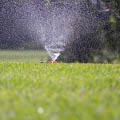 With increasing drought and consequently more water restrictions coming into force across Australia each year, it’s important to use grey water wherever possible for your lawn watering routine. Not only does this help you save the planet but it helps your pocket too!
With increasing drought and consequently more water restrictions coming into force across Australia each year, it’s important to use grey water wherever possible for your lawn watering routine. Not only does this help you save the planet but it helps your pocket too!
Grey water is made up of the wastewater from our showers, baths, spas, hand basins, laundry tubs, washing machines, dishwashers and kitchen sinks. (It doesn’t include water from toilets.) Used appropriately, you can water your garden with grey water and save around 400 litres of fresh water each day.
*This is an excerpt from Sydney Waters Website www.sydneywater.com.au
(http://www.sydneywater.com.au/SavingWater/InYourHome/GreyWater/)
It is important to note that different government areas have different rules regarding the use of Grey and Recycled water Wastewater is categorised as either grey water or black water.
Grey water is made up of the wastewater from our showers, baths, spas, hand basins, laundry tubs, washing machines, dishwashers and kitchen sinks. (It doesn’t include water from toilets.) Used appropriately, you can water your garden with grey water and save around 400 litres of fresh water each day.
Grey water can be diverted to your garden through direct diversion or a domestic grey water treatment system (DGTS). A DGTS will produce higher quality grey water to use in the garden and possibly your toilet or washing machine.
Black water is made up of the wastewater from our toilets, urinals and bidets. It is grossly contaminated by human excrement and requires a detailed treatment process such as a composting toilet before it is suitable to use in the garden.
NSW Health has guidelines that you must follow when treating black water, however it is not commonly used throughout Sydney.
Approximately 61 per cent of the total wastewater produced by an average household can be used as grey water. Kitchen wastewater is not usually included in this amount.
The table below indicates the total amount of wastewater and grey water produced in your home.
|
Wastewater source |
Total wastewater |
Total grey water |
||
| % Total | Litres per day | % Total | Litres per day | |
| Toilet | 32 | 186 | - | - |
| Hand basin | 5 | 28 | 7 | 28 |
| Bath/shower | 33 | 193 | 48 | 193 |
| Kitchen | 7 | 44 | 11 | 44 |
| Laundry | 23 | 135 | 34 | 135 |
| Total | 100 | 586 | 100 | 400 |
Things to consider
- Using grey water is just one of many ways to save water in your home and garden. Consider installing cost effective water saving devices such as tap aerators and water efficient showerheads.
- Always refer to NSW Health’s guidelines for the use of grey water.
- Untreated grey water is best diverted from the bath, shower and laundry rinse cycle only.
- Using untreated grey water in your garden means you may need to cut back on the amount of fertiliser you use.
- Treated grey water has had most nutrients like nitrogen and phosphorus removed, so it’s safer to use in large quantities.
- Only use grey water with watering systems that are under the soil surface.
- Make sure you get a licensed plumber to install your grey water system.
- Avoid using grey water on vegetable gardens if you’re going to eat the vegetables raw or lightly cooked.
- Keep an eye on how your plants react when you start using grey water, and consult your nursery if you notice any changes.
- pH test kits and Grey Water hoses can be obtained from most hardware stores (e.g. Bunnings) or nurseries
- If using washing machine water, avoid water containing fabric softener



